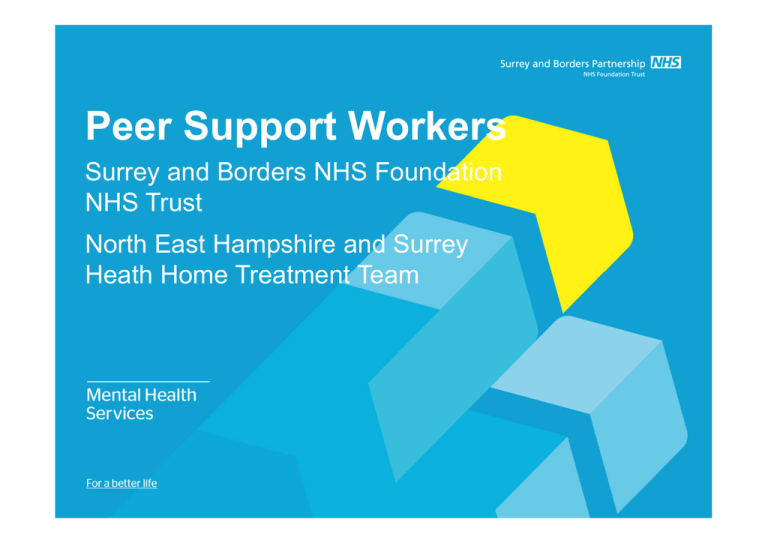Peer Support Workers Surrey and Borders NHS Foundation NHS Trust
advertisement

Peer Support Workers Surrey and Borders NHS Foundation NHS Trust North East Hampshire and Surrey Heath Home Treatment Team Peer Support Worker Team Colette Lane Mark Russell Jason Gray Stanley Masawi What is peer support Peer support is “offering and receiving help, based on shared understanding, respect and mutual empowerment between people in similar situations”. ImROC Briefing No 5: Peer Support Workers: Theory and Practice Peer support includes support or services provided to people with mental health problems by other people who have experienced mental health problems themselves. (Davidson et al 2006) “Peer support is a system of giving and receiving help founded on key principles of respect, shared responsibility, and mutual agreement of what is helpful. Peer support is not based on psychiatric models and diagnostic criteria. It is about understanding another’s situation empathically through the shared experience of emotional and psychological pain.” (Mead 2003) Raising the profile of peer support workers ‘No Health Without Mental Health’ (Department of Health, 2011) ‘No Health Without Mental Health Implementation Framework’ (Department of Health 2012) Mental Health Foundation (2012) Peer Support in mental health and learning disability. London, Mental Health Foundation. Together (2010) Lived Experience Leading The Way Peer Support in Mental Health. London, Together. MIND (2013) Mental health peer support in England: Piecing together the jigsaw. London, MIND. Mental Health Crisis Care Concordat (Department of Health, 2014 Surrey and Borders Partnership NHS Foundation Trust SABP has seven standards of involving people who use services People who use services and carers are actively involved in person-centred care There is effective and appropriate communication and information sharing People who use services and carers are involved in proposals for change People who use services and carer involvement is promoted and supported at all levels in Trust business People who use services and carers are involved in the monitoring and evaluation of services There is supported involvement of people who use services and carers in the recruitment and selection of staff There is monitoring and evaluation of people who use services and carer involvement CORE STUDY PHASE 3 CORE stands for Crisis resolution team Optimisation and RElapse prevention This is a National Institute of Health Research funded programme directed by Professor Sonia Johnson (UCL), and managed by Camden & Islington NHS Foundation Trust. What was involved LENGTH: 10 weekly meetings (approx. 1hr) in addition to their standard care WHAT: Structured activities workbook (Julie Repper & Rachel Perkins) – flexibility in delivery covering four sections Moving on after a crisis Keeping Well Managing ups and downs Goals and Dreams Our challenges Completing NHS jobs application forms! Staff should be able to challenge stigma Recruitment and admin systems should be as streamlined as possible No focus on Recovery during induction Induction was too intense – it needs to take into account the specific difficulties experienced by people who use services Beginnings – going into someone’s home for the first time Endings – very difficult for both peer and PSW The expectation of a 5 day induction was too much Boundaries between peer support and friendship can become blurred and difficult to maintain Induction material should be sensitive and tailored to the role. It could have taken into account prior experience. Emotional challenges of coping with life experiences faced by peers Lots of jargon in use at induction Acknowledging that it isn’t possible to help resolve every problem in this 10-week period of support Successes Peer support worker training was useful and essential Group weekly supervision was essential Knowledge that there was easy access to the team and supervisor Feedback from participants was encouraging Peer support is now part of what can be offered to people leaving CRHTT Peer support has been built into Safehaven Services business case SABP is aiming to recruit more peer support to provided structured intervention for those presenting in crisis Peer support has been well received by the inpatient units Peer support has now got support from senior clinicians –consultants and ward managers Peer Support Workers achievements Of the 35 participants recruited for the CORE project phase 3 18 participants were in the peer support group 2 relapsed needing input form acute care services 17 participants were recruited to the control group 9 relapsed needing support from the acute care services Peers were satisfied with our service and gave us positive feedback Participants felt at ease with us and felt they could communicate more easily with us. Reduced loneliness for peers Participants were linked into volunteering as part of their goals they had set with the peer support workers ‘You guys have the time to sit down and listen ‘ Improved social networks for peers Role model – You can do it and therefore so can I!! Improved problem solving skills PSW described as non-judgemental, flexible & reliable, supportive & encouraging. We were easy to talk to, friendly & nice and understanding FUTURE PLANS Repper (2013): Various studies indicate that if peer workers are well trained and supported and employed in a recovery focused service where peer to peer supervision is available, they have the potential to bring a range of benefits help service users plan responses to future crises a digital format of the workbook may be helpful for some and allow easy changes to the plan. Help convince senior managers and commissioners of the case for extra resources or organisational changes Implement a training programme for PSW Build a pool of peer support workers within the trust who can be supported into roles within the trust Feedback from people who have had peer support Thank you!! Any questions? colette.lane@sabp.nhs.uk Jason.gray@sabp.nhs.uk Mark.Russell@sabp.nhs.uk Stanley.masawi@sabp.nhs.uk Telephone number 01276 605566
